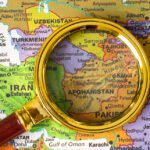During the holy month of Ramadan, many Muslims fast—that is, refrain from eating or drinking—from sunrise until sundown. This year, Ramadan occurs from March 11 to April 10, 2024. But many newly arrived Muslims are still learning to navigate the food resources available to them, and some are living in temporary accommodation with limited cooking appliances, which can make it difficult to prepare traditional foods in sufficient quantities to healthily break the fast each night. This blog post outlines how refugee service providers can meet the needs of Muslim clients who are observing Ramadan while living with limited food resources.
Planning for Ramadan Food Need
While it may not be possible for service providers to supply all of the meals, ingredients, or cooking equipment clients may want during Ramadan, staff can try to procure a few desirable options to make this 30-day period more comfortable for Muslim clients. Here are a few steps to take:
- Discuss clients’ needs and preferences related to food during Ramadan. Each culture will have its own traditional foods for Ramadan. For one example, see Switchboard’s checklist Traditional Afghan Ingredients For Ramadan.
- Assess cooking options, particularly for clients in temporary housing, and source any relevant donations. These might include microwaves, slow cookers, mixing bowls, cutting boards, serving plates and spoons, pots, and pans. Keep in mind that not all electric appliances are safe for hotel use; discuss with temporary housing partners ahead of time.
- Identify partners who can provide food, ingredients, or safe, hotel-friendly cooking appliances (see the Connecting with Partners section below for suggestions).
- Leverage existing funding to purchase and deliver needed food items.
Connecting with Partners
Consider reaching out to community partners to help expand clients’ traditional food access. Organizations and companies that may be able to support include:
- Local mosques and Muslim community organizations—most mosques provide food to Ramadan observers before the evening/dusk prayer. You can use Islamic Finder to locate a mosque in your clients’ area.
- Islamic Relief USA—Islamic Relief offers Ramadan food aid, including items like rice, lentils, oil, sugar, canned fish, meat, and dates. You can also call their primary phone number to be connected to local resources (1-855-447-1001).
- Islamic Circle of North America (ICNA) Relief USA—ICNA offers Ramadan food boxes with items like oil, beans, pasta, sauce, rice, flour, tea, and sugar.
- Shef—this for-profit company connects with local chefs to sell authentic Ramadan meals in Austin, Houston, Seattle, Boston, New York, Chicago, and the Bay Area. Note: Switchboard does not endorse any for-profit companies or products.
- Hunger hotlines—clients can call 2-1-1, or the national hotline 1-866-3-HUNGRY, to speak with a representative who can identify nearby food resources, including meal sites and food banks.
Supporting with Additional Needs During Ramadan
In addition to helping prepare for food needs, service providers may wish to take other steps to support clients during Ramadan:
- Inform schools about the month of Ramadan and request they temporarily excuse fasting students from physical education classes. See the International Rescue Committee (IRC) UK’s 5 Ways to Support Students During the Holy Month of Ramadan for more on youth-specific support.
- Speak with employers about offering Muslim employees more flexibility during Ramadan, especially if their jobs are physically demanding.
- Share educational resources: if your organization provides nutrition education, useful resources include Ethnomed’s Afghan Nutrition Guide (English, Dari) for Afghan Ramadan-observing populations and Cornell Health’s Tips for Healthy Ramadan Fasting for other Ramadan-observing populations. The National Resource Center for Refugees, Immigrants, and Migrants (NRC-RIM) also provides resources on Vaccines and Ramadan in seven languages.
This blog post includes contributions from Eugenia Gusev, Sr. Technical Advisor for Food Security and Agriculture, IRC; Lisa David, Deputy Director for USRAP Capacity Development, IRC; Ana Maria Teixeira, Deputy Director for Initial Resettlement, IRC; members of IRC’s Food Security Working Group; Lila Suboh, Deputy Director, RAI Measurement & Data Analysis, IRC; Gul Hussain Shinwari, former Sr. Program Officer, Afghan Placement & Assistance, IRC; and Farid Saydee, Independent Consultant, Language Mentors International.









